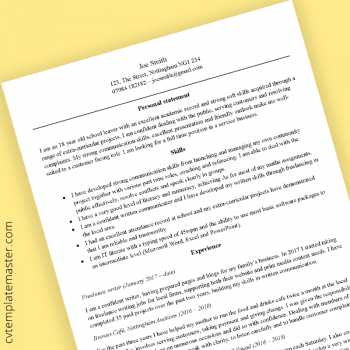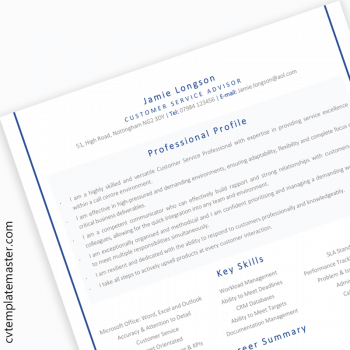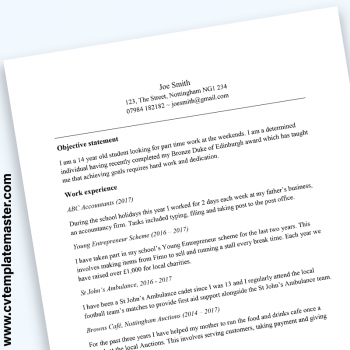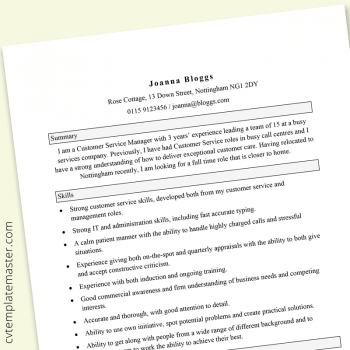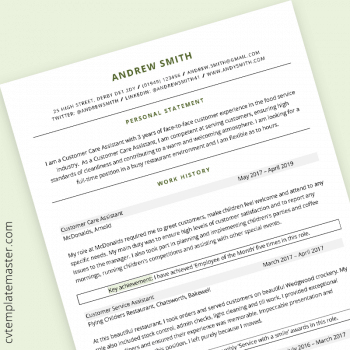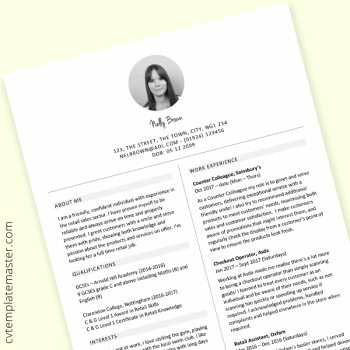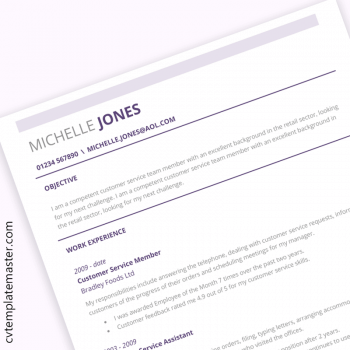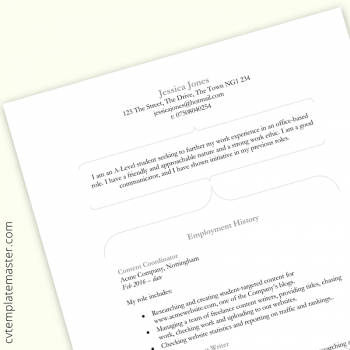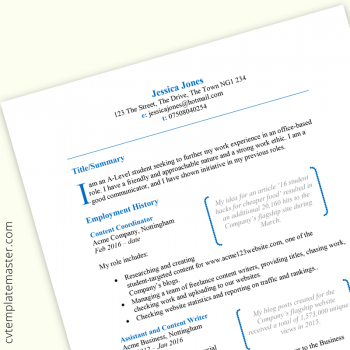How to write a customer service CV
A CV for a customer service role needs to provide the employer with evidence of the skills essential to customer service. These are:
- A willingness to go the extra mile
- Acting ability
- Adaptability
- Attentiveness
- Authenticity
- Communication skills
- Confidence
- Desire to learn
- Empathy
- Listening skills
- Patience
- Personal responsibility
- Positive attitude
- Positive language
- Problem-solving skills
- Product knowledge
- Professionalism
- Tenacity
- The ability to let it go
- The ability to respond quickly
- Time management skills
Source: Learn.g2
It’s important to keep these skills in mind when writing your CV. You should avoid simply listing them – instead, you should provide evidence that you have acquired and used them.
The job advert might mention some of these skills specifically. If it does, you should put the most emphasis on the skills it mentions as these are clearly the most important, from the employer’s perspective.
Providing evidence
Evidence for the most important customer service skills may be provided in any part of your CV. For example, you may have acquired problem solving skills in the workplace, through education or as a result of your hobbies. Consider at every stage of the CV how you can provide evidence through examples of how you acquired a skill and used it. Remember, written communication skills may be demonstrated throughout the CV through clear and concise language.
Giving contact information
Like any CV, you need to give your name and contact information at the top. It’s fine to put your contact details somewhere else on the CV (the side or bottom for example), as long as they’re easy to find.
You should include:
- First name and last name
- Address
- At least one phone number
- Your email address
- Any additional languages spoken
- ‘Full clean driving licence’ if travel is relevant to the role
You should NOT give:
- Your age
- Your date of birth
- Your nationality or race
- Your religion
- Whether you are married or single (and do not use ‘Mrs’ or ‘Miss’ on the CV)
- Whether or not you have kids
- Whether or not you are pregnant
- Whether or not you have a disability
In all but a few jobs, this information is entirely irrelevant and has no bearing on the role. Including it may lead to an employer discriminating against you.
Writing a personal statement
This is a concise summary of why you meet the job specification. Here is an example job advert:
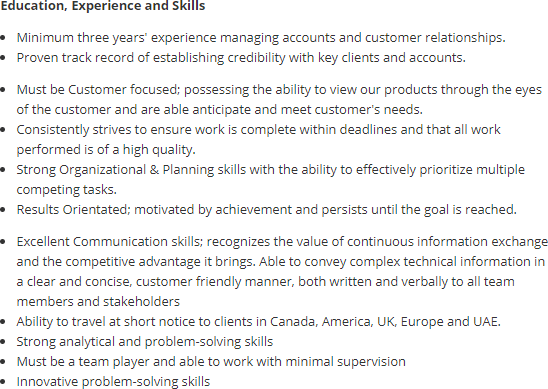
You might write in relation to the above:
“I am a customer service professional with 4 years proven track record of successfully managing accounts and customer relationships. I handle both new and current accounts in my current role. Through building an exceptional understanding of the products and customers’ needs and by providing excellent customer service, consultative support and negotiating/renewing existing customer contracts, I have increased turnover on my accounts by 15% year on year. I regularly travel in my free team and I am in a position to travel at short notice.”
This statement clearly doesn’t cover every part of the lengthy list of requirements, However it does cover enough of the core requirements to make an employer want to read more.
It’s crucial you don’t simply list off skills in your personal statement without providing evidence, Anyone can claim to have a skill – so simply saying that you have it adds no value to your CV. You need to show rather than simply tell. This applies throughout the CV – not just in the personal statement.
Giving your work history
For most people, the work history will be the biggest opportunity to demonstrate you have the required customer service skills. For each position, provide:
- Job title
- Dates of employment
- Employer (name, area)
- Brief description of duties
- Evidence of skills
If you’ve been given an alternative job title (as seems to be the trend) you may want to state a more conventional title instead. This is absolutely fine, provided that the title you give properly represents your role.
For example, if you’ve been called ‘Customer Relationship Coordinator’ and actually you’re a Customer Account Manager in all but name, it’s fine to say that. It can also make a big difference if the employer is using an Applicant Tracking System as they will be screening for the conventional job title.
Providing evidence of skills
Remember to show, not tell. Here are some examples of how you could do this within your work history:
- “I have met or beat all of my deadlines whilst in this role.”
- “I have a thorough understanding of our range of machinery with exceptional technical knowledge. I have demonstrated this consistently through putting together a range of complex solutions for customers, examples of which I have attached (include a sheet of case studies).”
- During my 4 years, I was given 5 new customers to manage in addition to my current customers. Through demonstrating exceptional product knowledge and by taking the time to thoroughly understand their needs, I have maintained all 5, developing an exceptional relationship and increasing customer spend by an average of 15% year-on-year.”
You can see just how specific these statements are. This is the key to showing rather than telling – you offer evidence of how you meet the job requirements, rather than just saying that you do.
Detailing your education
The job advert may not specify any particular education for a customer service role but that doesn’t mean you should ignore this section. Employers do like to see some basic qualifications such as maths and English, to a reasonable standard – if you have them.
If you’ve completed formal training during your employment, it’s worth including this here too.
Think about any relevant skills you might have acquired during your studies and include them here. These may have come about directly from study (such as written communication or research). Alternatively they may have come about through extra-curricular activities (such as debating, presenting, organising, problem solving, innovating, etc). This is another opportunity to offer evidence that you have the skills essential to a customer service position.
If you don’t have any formal training or qualifications at all, you might like to try some of the free customer service courses that are available.
If you live in England:
- Vision2Learn offers an online Level 2 Customer Service Course which is free if you are aged 19 or older, living in England and have lived in the EU for at least three years. They are a reputable and recognised organisation funded by the Skills Funding Agency.
- Vision2Learn also offer an online Level 2 Business and Administration course with the same eligibility requirements. Many of the skills taught on this course would be very useful in a customer service environment.
If you live elsewhere:
- Oxford Home Study offers a free home study 20 hour customer service course, available to all.
- Brentwood Open Learning College offers a free 20 hour customer service course, available to all – with a letter of completion at the end.
Listing hard skills
You’ll already be covering soft skills in the various parts of your CV – but what about hard skills? These are specific measurable skills that you have acquired and used, such as use of a software package. You can get some ideas for hard skills here.
Whilst lots of skills required for customer service are soft skills, many hard skills will be advantageous. For example:
- Use of CRM (Customer Relationship Management) software
- Use of Microsoft programmes such as Excel, Word, Powerpoint and Outlook
Make sure you specifically mention any hard skills listed in the job advert. This may include reading between the lines – for example, if the advert asks for someone who can deliver presentations competently, you can be sure that they want an advanced user of Powerpoint!
When it comes to hard skills, there’s no need to offer evidence. You can simply list the skill and give your proficiency – e.g. ‘beginner’ ‘intermediate’ or ‘advanced’, or a specific level if appropriate.
Detailing memberships
If you’re a member of a relevant professional organisation, mention it here. This helps to show that you take your career in customer service seriously and have a passion for the profession. Some examples include:
Mentioning awards
If you’ve received any relevant awards either during your education or at work, list them here. These might be, for example, ’employee of the month’ awards, or more prestigious annual company awards. Do list any awards that demonstrate transferable skills (such as debating at University).
There are a very wide range of customer service awards that you can enter for – a list can be found here.
Including hobbies and interests
So many job applicants miss a huge opportunity to showcase more of their skills in the hobbies and interests section. For example,
- Planning and prioritising (e.g. a community project)
- Working with others as a part of a team (e.g. a community project, volunteering, sports)
- Problem solving (e.g. a community project, personal goals)
- Persistence (e.g. a community project, personal goals, charity work)
- An interest in health and wellbeing (e.g. going to the gym, sports, yoga, meditation)
In addition to demonstrating soft skills, hobbies can help demonstrate that you’re a great fit for an organisation. This is of huge importance to so many employers. A two year study on hiring in professional service firms revealed:
“Hiring is more than just a process of skills sorting; it is also a process of cultural matching between candidates, evaluators, and firms. Employers sought candidates who were not only competent but also culturally similar to themselves in terms of leisure pursuits, experiences, and self-presentation styles. Concerns about shared culture were highly salient to employers and often outweighed concerns about absolute productivity.”
Source: ASA Net
Giving references
Two references should be given – however, it’s fine to write ‘available on request’ for this section, or leave it off altogether, as these can be provided once you have a job offer.
